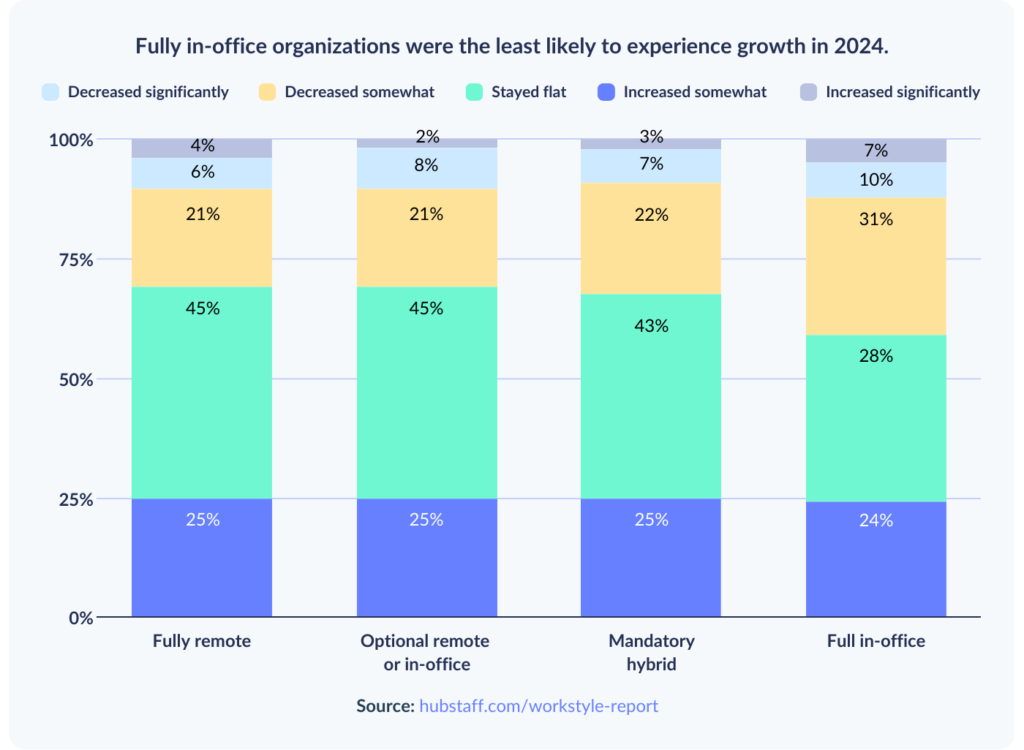In a world where pajamas have replaced office attire and the daily commute involves a stroll from the bedroom to the home office, remote work can feel like pure bliss — until remote work-life balance begins to suffer. That’s why we’ve compiled a list of the best remote work tips to help you maximize this constantly evolving way of working.
Navigating remote work has become an art form in this new reality of virtual collaboration and screen-bound connections. As we embrace this monumental shift, we must master effective remote work strategies.
Just as we have become accustomed to it, remote work is transforming again. Many organizations are now transitioning toward hybrid work models that combine remote and in-office collaboration. According to the Pew Research Center, 41% of workers with jobs that can be done remotely are working a hybrid schedule.

Whether you’re a seasoned remote worker or a bold newcomer, let our insights and actionable tips guide you. In this post, we’ll include the best practices for working from home for our team and lots of data to back up our approach.
Boost your team’s efficiency with Hubstaff's productivity tools
Table of contents
- 10 essential tips for remote work success
- 1. Prioritize a healthy work-life balance
- 2. Create a designated workspace
- 3. Stick to a schedule
- 4. Learn to communicate asynchronously
- 5. Master the art of taking breaks
- 6. Get creative with team socializing
- 7. Determine remote work expectations
- 8. Become outcome-obsessed
- 9. Track your workload
- 10. Build your remote work toolbox
- Celebrating the future of work: final words on remote work best practices
10 essential tips for remote work success
As our world becomes increasingly interconnected and digital, the traditional nine-to-five office grind has given way to a more dynamic and flexible working method. With the global surge in remote work, discovering successful virtual work methods has become essential.
These ten best practices will improve productivity, efficiency, and a harmonious work-life balance.
1. Prioritize a healthy work-life balance
Prioritizing a healthy work-life balance is paramount for remote workers to prevent burnout and maintain long-term well-being. We’re introducing this best practice first because it’s the overarching theme of what remote workers should strive for — especially since they tend to work more than their in-office counterparts.
Here are our top remote work approaches to help employees strike that delicate balance:
- Set clear boundaries. Establish dedicated work and non-work hours, and communicate them to your colleagues and family. According to the National Institutes of Health, employees who blur the lines of work-life boundaries reported a deterioration in healthy lifestyles.
- Utilize a time management tool. Time management tools ensure you’re paid for the time you work and help you avoid overworking. A National Institutes of Health study shows that time management is linked to improved job performance, academic achievement, and well-being.

- Learn to unplug: Once your work hours are over, turn off notifications and resist the urge to check emails or engage in work-related activities. This also includes shutting off your screen for a set time every day — the American Psychological Association has linked excess screen time to a poorer quality of life and health consequences.
- Regular exercise: Incorporate physical activity into your daily routine, whether a morning yoga session, a lunchtime walk, or an evening workout. Exercise is not only good for physical health but also aids in stress reduction, according to the Mayo Clinic.
- Mindfulness and meditation: Dedicate time to mindfulness or meditation practices to alleviate stress and improve focus. A Mayo Clinic study found that people who meditate report improved mood, sleep, and concentration.
2. Create a designated workspace
A dedicated workspace can be the foundation for the elusive, highly sought-after work-life balance for remote team members. A suitable remote work area means having a comfortable physical space that promotes productivity.
We all know that a space with minimal distractions and powerful Wi-Fi is necessary for productive work, but let’s examine some compelling, scientifically supported data on building a workspace.
- Proper ergonomics. According to the U.S. Occupational Safety and Health Administration, following ergonomic best practices helps lessen muscle fatigue and increase productivity. It’s no wonder that 54% of experts consider ergonomic furniture a top priority in every home office.
- Good lighting. A study from Cornell demonstrated that workers exposed to natural light experienced an 84% decrease in concerns like headaches, eyestrain, and blurred vision.
- Natural elements. The National Institutes of Health found that exposure to natural elements in the workplace positively impacts employees’ mental health.
A designated workspace provides a clear boundary between work-related tasks and personal life, making it easier to focus during work hours and disconnect during leisure time.
3. Stick to a schedule
One of the advantages of remote work is flexibility — but it can be a double-edged sword.
With a clear schedule, you can eliminate commute times, cook lunch at home to save money, and be closer to your family. But when beginning to merge work and home life, it isn’t always easy on one’s mental health. 47% of remote workers in the U.S. are concerned about the blurred lines between work and personal life.
A routine that includes set work hours, breaks, and a defined end to the workday can help remote teams maintain a sense of order and structure. With the right remote work tools and strategies, remote teams can harness the benefits of a flexible work environment while maintaining a balanced and productive routine.
4. Learn to communicate asynchronously
Communication is the core tenet of remote work. Without it, remote employees might feel physically and emotionally isolated from their colleagues and miss out on essential information and updates.
According to a McKinsey report, improved communication and collaboration through social technologies could raise the productivity of interaction workers (high-skill knowledge workers) by 20-25%. For remote teams, one of the best ways to improve remote collaboration is through asynchronous communication.
What is asynchronous communication? Asynchronous (async) communication is the practice of exchanging information, updates, or messages without the need for immediate, real-time responses.
Learning to communicate asynchronously is vital for remote workers in the digital age. It also enables remote workers to break free from the constraints of synchronous communication that can lead to burnout and inefficiency.
As some departments or teams move to a hybrid model, asynchronous communication also becomes increasingly valuable for ensuring those at home aren’t left out of critical meetings and discussions.
If your global team can master async communication, you can use it to increase productivity with 24/7 coverage for customer support, sales, and an array of other departments.

5. Master the art of taking breaks
With the absence of physical boundaries that separate work and personal life, remote workers often find themselves entwined in their tasks without clear distinctions.
Studies show that sitting in front of a computer for long periods can lead to burnout and stress. Taking regular breaks as a remote employee is crucial to maintaining productivity, well-being, and work-life balance.
So, how can you master the art of taking breaks in a remote environment?
- The Pomodoro Method: The Pomodoro technique encourages focused work for 25 minutes, followed by a 5-minute break.
- The 52-17 Rule: Follow a cycle that aligns with your natural ultradian rhythms by working for 52 minutes followed by a 17-minute break.
- Mini meditation: Practice a short mindfulness meditation to reduce stress, improve focus, and give your mind adequate rest. You can make meditation part of your morning routine or create your own schedule for smaller sessions throughout the day.
- Social break: Connect with colleagues, friends, or family through a quick chat or video call for social interaction. You could even try a lunch break and meet up with other remote workers at a restaurant or local coffee shop.
- Creative breaks: Spend time on a creative hobby or activity you enjoy, such as drawing, playing a musical instrument, or crafting.
Remember that your breaks aren’t just leisure moments — they’re also essential for your efficiency, creativity, and, most importantly, happiness.
6. Get creative with team socializing
In the age of remote work, remote employees face one of the most significant challenges: the lack of in-person interactions and the potential for social isolation.
Remote work skeptics have coined the term remoteliness to describe the feeling of isolation or loneliness that remote employees may experience. To combat remoteliness, remote employees can get creative in their approaches to socializing. These initiatives also help bridge the gap between remote teams and the camaraderie found in traditional office settings.
As a fully distributed team, we’ve learned to get creative in our attempts to stay connected.
- In-person retreats: Once a year, our team gathers in person for a retreat where we focus on team building, socializing, and collaboration.
- Virtual retreat: In-person retreats can be costly and complex, so we also host virtual retreats a few times per year.
- Slack channels: Get creative with your Slack channels to encourage collaboration. Some channels we use at Husbtaff include #what-to-read, #hobbies, and #catparentsinc.
- Team building activities: Host virtual team building activities where your team can participate in games and exercises to build camaraderie.
Virtual retreats and innovative approaches to social interaction serve as a testament to the adaptability and resilience of remote workers in the face of new work paradigms.
7. Determine remote work expectations
Setting clear expectations is a cornerstone of successful remote work. It’s the foundation of a healthy work environment for effective communication and productivity. Getting on the same page can help team members feel secure, and help leaders manage remote employees.
Here are some key aspects to consider when setting expectations for remote work. If you’re a manager, it’s your job to clarify these standards. If you’re a remote employee, you might need to request clarification on topics like:
- Preferred communication channels for different types of communication
- What processes and tools will the team use to manage projects
- Hybrid work expectations like how much time employees will spend in the office vs. remote
- Reporting structures and expectations
- Communication standards like how soon team members need to reply to requests
- Company culture, values, and goals
- Feedback and evaluation process and KPIs employees should be hitting
- Technology and security guidelines

Organizations and remote employees can cultivate a working relationship built on trust, transparency, and mutual understanding by setting clear expectations. This clarity enhances productivity and fosters a positive remote work environment that promotes collaboration, innovation, and remote job satisfaction.
8. Become outcome-obsessed
Being outcome-obsessed is a mindset that strongly emphasizes the results and impact of one’s work rather than merely focusing on the process or the number of hours worked. Unfortunately, a lot of companies have a culture of productivity theater.
The outcome-obsessed mindset begins by clearly defining objectives and key results. Remote workers must understand what success looks like to achieve expectations.
So how can you do this?
- Set goals. Setting specific, measurable, achievable, relevant, and time-bound (SMART) goals.
- Track your progress. This includes work hours, projects completed, and time spent completing a task.
- Make data-driven decisions. Base decisions on data and metrics whenever possible. Data provides insights into what works and what needs improvement.
Remote work’s flexibility often allows for a results-oriented approach. Remote workers can maximize their productivity within personal timeframes and work styles by concentrating on outcomes.
9. Track your workload
Tracking your workload allows remote workers to estimate how long specific tasks take and identify areas where they can make improvements. It lets you plan your day more effectively, allocate sufficient time to high-priority tasks, and meet deadlines.
Project management software, time tracking software, and to-do lists are invaluable resources. These tools help remote employees create a clear overview of their tasks, set priorities, and allocate time to various projects.
Workload tracking also aids in maintaining work-life balance. You can set boundaries and avoid overcommitting by having a visual representation of your tasks and deadlines.
10. Build your remote work toolbox
Building a remote work toolbox is critical for teams to thrive in remote and hybrid roles. As remote work becomes increasingly prevalent, the right combination of tools can make all the difference in productivity, collaboration, and work-life balance.
Here is what you will need:
- Communication tools: Tools like Slack, Microsoft Teams, or Zoom facilitate real-time communication and collaboration with video, audio, and screen-sharing capabilities.
- Virtual Private Network (VPN): A VPN, like Perimeter 81, NordVPN, or ExpressVPN, ensures secure and encrypted internet connections.
- Note-taking and document management: Tools like Evernote, Google Drive, or Microsoft OneNote are essential for keeping notes, storing documents, and collaborating on files.
- Project management software: Project management tools like Hubstaff Tasks, Trello, or Monday.com are invaluable for remote teams. These platforms help you organize tasks, set priorities, collaborate with team members, and track project progress.
At Hubstaff, we use our software as an all-in-one remote workforce management system. Using workforce management tools, we can:
- Automate time tracking and track time to tasks
- View productivity metrics
- Create workflows and track progress in real-time
- Manage vacation days, time off, and sick leave

Your remote work toolbox should evolve to suit your needs, but these foundational tools are a solid starting point. They equip remote teams with the technology needed to excel in a digital workspace by fostering productivity, communication, and seamless collaboration.
Celebrating the future of work: final words on remote work best practices
By following these ten best practices, businesses can ensure that their remote workforce remains productive, effective, and well-rounded.
Remember, there is no one-size-fits-all approach. Not all employees work the same way. Still, with the right tools and our remote work productivity hacks, remote work can be a successful and enjoyable experience.
Most popular
The Critical Role of Employee Monitoring and Workplace Security
Why do we need employee monitoring and workplace security? Companies had to adapt fast when the world shifted to remote work...
15 Ways to Use AI in the Workforce
Whether through AI-powered project management, strategic planning, or simply automating simple admin work, we’ve seen a dramatic...
The AI Productivity Panel: Lessons From Leaders on What’s Working (and What’s Not)
When I moderated this AI productivity panel, I expected a solid conversation. What I didn’t expect was the flood of real-world i...
Employee Performance Dashboards: Templates, Tools, and Best Practices
Keeping track of how your team’s really doing can be tricky. Spreadsheets pile up, one-on-ones only tell part of the story, and...




